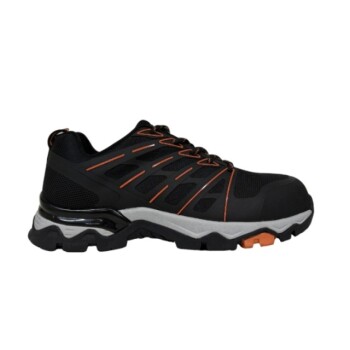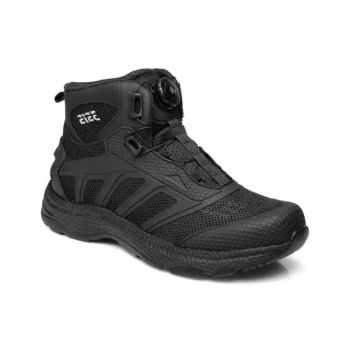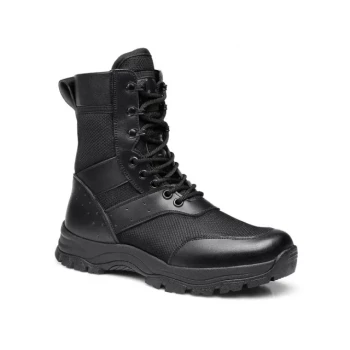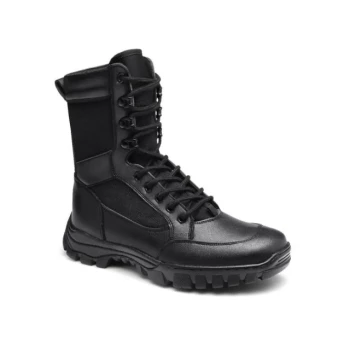At their core, wellington boots are an exceptional tool for a specific job. Their primary advantages are complete waterproofing, excellent protection from mud and dirt, and simple, easy-to-clean designs. However, their main disadvantages stem from a lack of breathability, poor insulation in cold weather, and a less-than-perfect fit that can be restrictive or uncomfortable for extended wear.
The true value of a wellington boot is not in the boot itself, but in how well its specific material and design are matched to your intended activity. Understanding the trade-offs between different types is the key to avoiding discomfort and dissatisfaction.
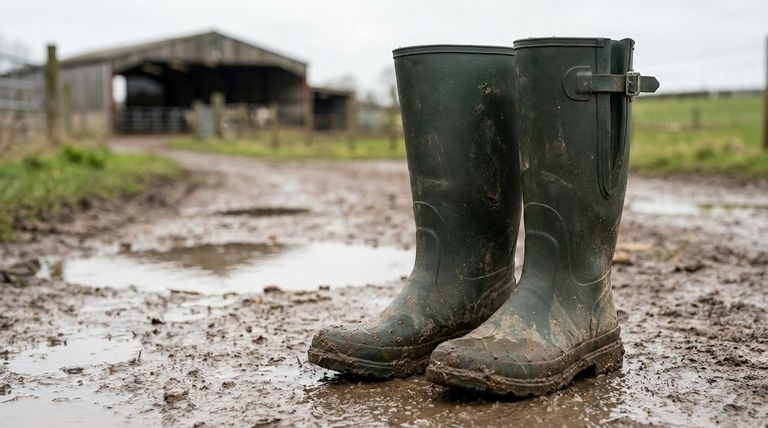
The Core Advantages of Wellington Boots
Wellington boots, or "wellies," serve a distinct purpose. Their design prioritizes utility and protection over other footwear characteristics.
### Absolute Waterproofing
The single greatest advantage of a wellington boot is its seamless, waterproof construction. Unlike other boots that rely on membranes or coatings, most wellies are made from a single molded piece of natural rubber or PVC, making them impervious to water from the outside.
### Protection from the Elements
This design provides a formidable barrier against more than just water. Wellies are ideal for navigating mud, chemicals, and general grime, keeping your feet and lower legs completely clean and protected in agricultural, industrial, or messy garden environments.
### Unmatched Ease of Use
The simple, pull-on design and smooth exterior make wellies incredibly practical. They are fast to put on and take off, and cleaning is as simple as hosing them down. This low-maintenance aspect is a significant benefit for frequent outdoor work.
Understanding the Inherent Trade-offs
The simple design that provides the core benefits of a wellington boot also creates its most significant drawbacks. Acknowledging these limitations is crucial.
### The Breathability Problem
The same seamless construction that keeps water out also traps moisture in. In warm weather or during strenuous activity, this lack of breathability can lead to significant sweating and discomfort.
### The Insulation Gap
Most standard wellies offer very little insulation. Materials like PVC and basic rubber conduct cold, meaning your feet can become chilled quickly in winter conditions unless you wear thick, insulating socks or choose a boot with a specialized neoprene lining.
### Fit and Comfort Challenges
Wellington boots are not known for their ergonomic design. The fit is often loose to allow for easy entry, which can lead to a "suction effect" when removing them. They typically lack the arch support and cushioning found in dedicated walking or hiking boots.
### The "Over the Top" Risk
While the boot itself is waterproof, its protection is limited by its height. Stepping in water deeper than the boot's shaft or having a poor fit around the calf will allow water to pour in from the top, defeating the primary purpose.
Not All Wellies Are Created Equal: A Material Breakdown
The material of your boot is the single most important factor determining its performance, durability, and cost.
### Standard PVC: The Lightweight Basic
Boots made from PVC (Polyvinyl chloride) are typically the most affordable and lightweight option. They are perfectly waterproof and easy to clean, making them a good choice for casual, light-duty tasks like gardening.
### Natural Rubber: The Flexible Standard
Natural rubber is the traditional and more premium material. It offers superior flexibility, durability, and comfort compared to PVC. It is less prone to cracking in cold temperatures and is the material of choice for demanding, regular use.
### Specialized Linings
The interior lining has a major impact on comfort. Basic cotton-lined boots are easy to slide on but offer minimal warmth. For colder climates, neoprene-lined boots provide significant insulation and extra cushioning.
Key Features to Consider
Beyond the core material, certain design features can dramatically alter the boot's function and fit.
### The Role of Zips and Gussets
To combat the notoriously poor fit of traditional wellies, many models now include full-length zips or adjustable side gussets. These features allow for a much more secure and customized fit around the calf, though a zipper can present a potential weak point for waterproofing if not well-designed.
### Reinforced Toes
For agricultural or industrial settings, safety is paramount. Some wellington boots come with reinforced or steel toe caps to provide crucial protection against impacts and compression, blending the benefits of a welly with the safety of a work boot.
Making the Right Choice for Your Activity
To select the right boot, you must first define its primary purpose.
- If your primary focus is occasional light gardening: A simple, lightweight PVC boot offers the best value and is perfectly suited for the task.
- If your primary focus is frequent, demanding work (e.g., farming): Invest in a durable, flexible natural rubber boot, potentially with a reinforced toe for safety.
- If your primary focus is staying warm in cold, wet conditions: Prioritize a neoprene-lined boot that offers insulation and choose a size that allows for thick wool socks.
- If your primary focus is finding a comfortable, secure fit: Look for a model with an adjustable side gusset or a full-length zip to tailor the boot to your leg shape.
Ultimately, choosing the right wellington boot is about selecting the right tool for the job.
Summary Table:
| Feature | Advantage | Disadvantage |
|---|---|---|
| Material | Waterproof (rubber/PVC), durable | Poor breathability, can be cold |
| Design | Easy to clean, pull-on style | Often loose fit, limited support |
| Use Case | Ideal for mud, water, messy tasks | Uncomfortable for long wear, poor insulation |
As a large-scale manufacturer, 3515 produces a comprehensive range of durable, waterproof wellington boots for distributors, brand owners, and bulk clients. Whether you need standard PVC for light gardening or reinforced natural rubber for demanding work, we deliver quality and reliability. Contact us today to discuss your footwear needs and benefit from our extensive production capabilities!
Visual Guide
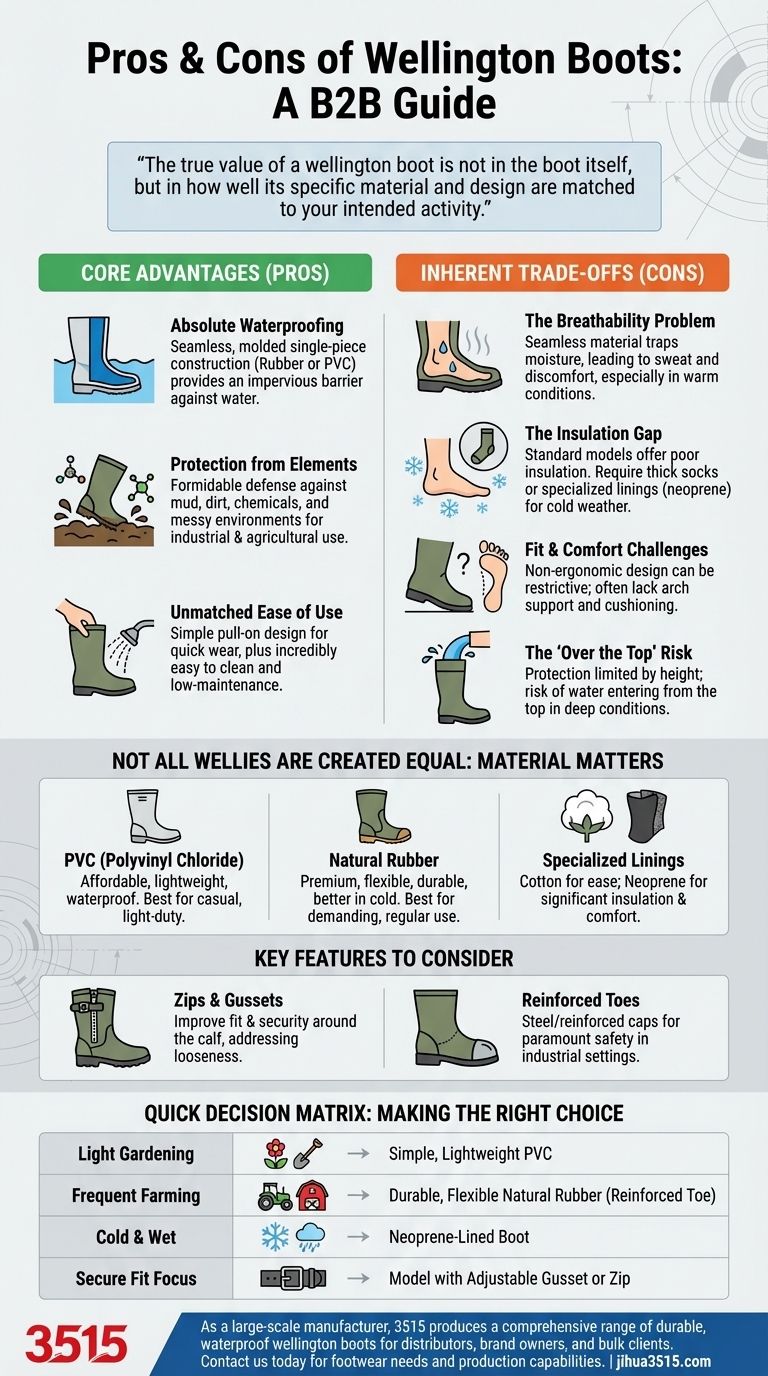
Related Products
- Safety Footwear Wholesale Manufacturer for Custom OEM/ODM Production
- Factory-Direct Wholesale Canvas Boots with High-Traction Rubber Soles
- Factory Direct Wholesale Rain Boots Durable Waterproof & Fully Customizable
- Premium Flame-Retardant Waterproof Safety Boots and Shoes
- High Performance Fire-Retardant Waterproof Safety Boots
People Also Ask
- Do snake bite boots work? Your Ultimate Guide to Effective Snake Bite Protection
- How do safety shoes contribute to cost savings for companies? A Strategic Investment in Risk and Cost Management
- How long can you wear safety boots? The Lifespan is Determined by Wear, Not Time
- What are the differences between steel toe, composite toe, and alloy toe Wellington boots? Choose the Right Safety Toe for Your Job
- Is safety-toe as good as steel toe? Choose the Right Protection for Your Job












